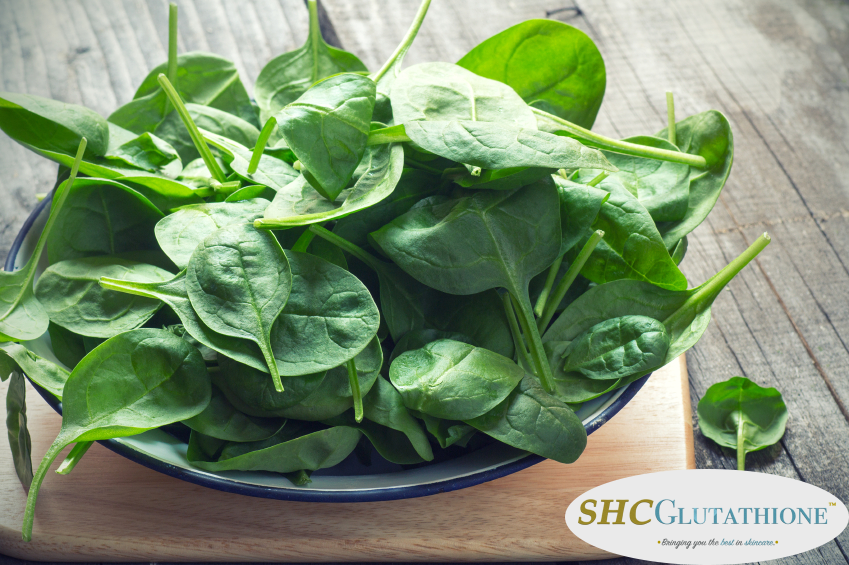
Last Updated Nov 2, 2018 | Published Sep 14, 2018 at 14:31PM | Author: SHCGlutathione
Other ways to Boost Glutathione Levels
Boosting one’s natural Glutathione production should be deemed a priority in today’s modern world. The over-consumption of junk foods and our increased exposure to toxic substances like smoke and air pollution have greatly depleted our body’s capability of producing Glutathione to sufficient levels. Some other ways in which you can naturally boost your body’s natural production of Glutathione include Whey Protein, A-Lipoic Acid supplements, or simply increasing your consumption of Methylation-rich nutrients found naturally in high folate-rich foods.
Whey Protein is rich in Glutathione and is found naturally in the food we eat. When considering Whey Protein, make sure to consume only grass fed, grass finished, organic, whey protein sources to ensure you are getting a rich and highly nutritious blend of Whey Protein. It is also best to avoid all sources of protein isolates or other types of processed whey proteins. [63, 64]
Alpha Lipoic Acid, is another highly potent Glutathione boosting supplement. It primarily aids in liver functioning and supports the immune system in fighting off infections and viruses. It is clinically recognized as being a supportive aid in fighting off diabetic neuropathy and improving insulin sensitivity in insulin-resistant patients. Evidence has shown taking between 300 -1200mg of alpha lipoic acid can drastically help improve overall health and boost the production of GSH within the body. [65]
Methylation rich foods are specific foods which contain high amounts of B vitamins. Especially Vitamins B6, B9, B12, and biotin. These B vitamins help improve long term health and longevity by supporting the body to assimilate Glutathione much more efficiently. By simply incorporating a half a cup of chickpeas in your diet on a regular basis, you can give your body well over 100% of its required daily amount of Methylation rich nutrients, and thereby drastically improve Glutathione production. Other good sources of methylation rich nutrients include Organic Grass Fed Liver, Pinto Beans, and Lentils which all provide the body with other 50% of it’s required amount. [66]

Facts about Glutathione
Glutathione plays a pivotal role in the long term health and preservation of the human body. It exists within each and every cell and is involved in the direct functioning of the human cells. [1] Glutathione pronounced as “
This powerful antioxidant has been coined by doctors such as Mark Hyman, MD, as “The Mother of All Antioxidants” due to its incredibly powerful anti-oxidant properties. [2] Many doctors also refer to it as “The Powerhouse for Detoxification“, as it quite literally is the driving force of health within the cells of the human body. Its primary function within the body is to aid in the detoxification of the liver. It does so by eradicating harmful “free radicals” and reducing oxidative stress within the body.
Oxidative stress can be caused by chronic illness, an over-exposure of environmental toxins, consumption of genetically modified foods, and prolonged exposure to heavy metals. It also plays a vital role in improving and maintaining proper immune function, as it aids in the multiplication of lymphocytes. Lymphocyte cells ensure specific immune responses are activated within the body in response to external stimuli, allowing for proper immune development. [3, 4]
The Key Benefits of Glutathione
There exist over 139,000 audited and peer-reviewed scientific studies detailing the benefits of Glutathione. [5]
- Glutathione helps drugs and medication “conjugate” better, meaning they link better together. In particular, chemotherapy drugs which require a high level of absorption in order to work effectively. [6]
- Glutathione improves immune functionality as a result of reduced toxicity, and less oxidative stress. [7]
- Glutathione helps the liver detoxify fat taking the strain off of the gallbladder.
- Glutathione helps with protein synthesis. [8]
- Glutathione aids in the absorption of other vital antioxidants, like Vitamin C and E, by helping to keep them in their active form. [9]
- Glutathione prevents ‘cellular death’ through the regeneration of old and damaged cells. This process is known as “cancer apoptosis“. [10]
Why You Should Use Glutathione
Glutathione is the one and only “Intracellular Antioxidant“, meaning it operates directly within the cell itself. Understanding the importance of Glutathione is crucial, as without it our cells would not function the way they do. [11,12,13] Experts are now recognising just how important Glutathione is, and several research studies have revealed how many of us are highly deficient in this very crucial and very powerful antioxidant.
Recent medical forecasts have revealed substantial links between the longevity of one’s health and age, and the level of Glutathione found within the body. Centenarians in particular (those believed to have lived past 100 years old) were shown to have high levels of Glutathione in their cells. An interesting observation, since the human cells are the lifeblood of all human functioning. Healthy cells promote a healthier body, which consequently results in the individual being less prone to common age-related ailments and diseases. [14, 15]
Who discovered Glutathione
When did it become recognized for its unique properties and who was the first to discover it? Glutathione was first discovered in the 18th century by a man called De-Rey-
The Top 10 Supplements and Ways to Naturally Boost Glutathione Levels

Although our bodies naturally produce Glutathione, our modern diets, excessive exposure to pollution, heavy metals and our over-consumption of OTC medication negatively impact our bodies ability to generate Glutathione. This imbalance in the production of Glutathione in the liver can result in long term damaging effects on our overall health. [17] Glutathione deficiency is still classified by the National Institute of Health (NIH) as a relatively rare disease, however, such classifications are made on the basis of severe deficiency.
There is a growing consensus among health professionals, and healthcare advocates that the vast majority of people are highly deficient in Glutathione but only to a much lesser degree than what is required by the classification model. Nonetheless, we should all be looking to increase our Glutathione levels to reduce our susceptibility to disease, cancer, and infections. [18, 19]
The Common Symptoms of Glutathione Deficiency
Glutathione deficiency is also known as a “Glutathione synthetase deficiency” can vary between person to person from mild to severe. Common symptoms of a glutathione deficiency can include: severe to mild cases of
How to Increase Your Glutathione Levels
Adopting better lifestyle habits, and consuming a diet rich in “GSH sulfur-rich foods” is exactly the way to go, whilst also supplementing with specific Glutathione supplements which offer the body a high bioavailability (meaning they are easily absorbed by the human body). [21]
Let’s take a look at some of the best ways you can begin to increase your Glutathione production:
1. Consume Sulfur Rich Cruciferous Vegetables

Cruciferous vegetables are unique in that they contain high quantities of sulfur. These sulfur molecules give the vegetables the very unique property of aiding in Phase 1 Detoxification of the liver. [22] Sulfur occurs in two active forms in food, as methionine and cysteine. It can be derived in the diet from both animal sources (e.g. fish, beef and poultry) or through vegetarian sources such as high-sulfur containing cruciferous vegetables. [23] You can begin by including more dark leafy green vegetables in your diet. These vegetables can include, broccoli, Brussel sprouts, kale, spinach, cauliflower, mustard greens, radish, and bok choy. [24] Other types of vegetables, when eaten in their raw state such as onions, shallots, and garlic are also known to boost glutathione levels. Known as ‘
2. Supplement with S-Acetyl Glutathione

S-Acetyl L-Glutathione is simply an acetylated form of Glutathione. Supplementing with S-Acetyl L-Glutathione is considered a far superior form of glutathione. Taking a combination of both L-Glutathione and S-Acetyl L-Glutathione is known to drastically enhance GSH levels in the body. Various studies have reported the high bio-availability of this form of Glutathione and its stability in the digestive tract in comparison to other forms of Glutathione. The excellence of S-acetyl l-glutathione lies in its ability to permeate into the membrane of the mitochondria, and then directly into the blood plasma. It also has the potential to cross the blood-brain barrier allowing it to directly detoxify and protect the brain. The oral intake of S-acetylglutathione has been known to increase total glutathione and percent-reduced glutathione. Percent-reduced glutathione is considered a highly significant biomarker of health status. [26]
How is S-Acetyl L-Glutathione absorbed? S-Acetyl L-Glutathione is constructed in a lipid-like compound, bonded by an acetyl bond, part of the thiol group. The acetylation process prevents the breakdown of the Glutathione into its three amino acids, allowing the molecule to pass, whole, directly into the cells. This also means it does not require the necessary energy expenditure normally required by reduced forms of glutathione once it crosses the cell wall. [27]
3. Supplement with N-Acetyl L-Cysteine
N-A-C, or scientifically
4. Supplement with an Oral L-Glutathione Supplement
Regular consumption of Oral L-Glutathione supplements is a highly popular and highly convenient way of increasing your GSH levels. However, to ensure the proper uptake of Glutathione you should always take a high-quality supplement, in a highly bio-available form. When taking a Glutathione supplement, always ensure you take Vitamin C with it. The best form of Vitamin C is Liposomal Vitamin C, which involves encapsulating the Vitamin C in a phospholipid (fat soluble) compound, forcing the Vitamin C to directly enter the cell in its complete state without being broken down by stomach acids in the gut. [32] Vitamin C acts sort of like the vehicle for Glutathione, without sufficient amounts of Vitamin C, Glutathione will remain in an oxidized state in the form of GSSG (an inactive form of GSH) as opposed to its active form (GSH).
5. Increase your Vitamin C Intake

Having sufficient Vitamin C levels in the body is not only critical but essential to so many functions within the body. It is no wonder that every healthcare practitioner prescribing Glutathione for patients will also instruct their patients take their Glutathione with a double dosage of Vitamin C in order to ensure the proper activation of Glutathione in the body. [33] Both Vitamin C and Glutathione are water-soluble vitamins, this means the excess is flushed out of the body via the urine. Vitamin C rich foods include cabbage, sauerkraut, strawberries, kiwi and bell peppers.
Various medical studies have been released showing the potential of Vitamin C to up-regulate lymphocyte production of Glutathione in human cells. Some studies have shown how higher levels of this antioxidant in the body, spares the bodies natural Glutathione production, allowing Glutathione levels to remain at sufficiently high levels. [34, 35] Research has shown that simply taking upwards of 500mg – 1000mg Vitamin C supplement on a daily basis for a period of 13 weeks or more (3+ months) can increase the concentration of Glutathione in the white blood cells by over 20%. [36]
According to The American Journal of Clinical Nutrition, based on an experimental study released in 1993: “Vitamin C supplementation (500 mg/d) maintains reduced glutathione concentrations in blood and improves the overall antioxidant protection capacity of blood.” The Journal of BioChemistry also concluded via an experimental study conducted in 2007, that: “Vitamin C protects endothelial cells from oxidative stress by neutralizing the effects of oxidative species and decreasing blood cell-endothelial cell interactions, while glutathione modulates the redox properties of vitamin C in endothelial cells. Clinical studies have revealed that vitamin C can reverse endothelial dysfunction under different pathological conditions such as hypercholesterolemia, hypertension, smoking, diabetes, and atherosclerosis”
A broad range of clinical research and medical research studies have revealed a strong relationship between Glutathione and Vitamin C, pointing to the fact that Glutathione and Vitamin C work synergistically within the body. A low intake or a low production of either of these two important antioxidants is likely to result in greater oxidative damage to the body and a significant detrimental impact on overall health and wellbeing. [37]
6. Reduce your Alcohol Consumption / Quit Smoking

Alcohol is one of the biggest antigens (toxins) to the body, and primarily to the liver. [38] Daily consumption of alcohol and alcohol abuse has been linked to severe Glutathione depletion in the blood. The effect of alcohol abuse and the concentration of Glutathione serum levels is significantly impacted in those with a persistent intake of alcohol, whereas those who do not consume alcohol on a daily basis are spared such effects. [39]
In fact, taking a Glutathione supplement after a hangover has been shown to reduce common hangover symptoms. It’s not uncommon to suggest Glutathione is the ultimate “Hangover Fix”, simply because of its intense liver-detoxifying effects. Glutathione ‘conjugates’, meaning it binds together with xenobiotics using glutathione-S-transferase (GST) and excretes it via the urine as mercapturic acid. [40]
Smoking is also known to inhibit Glutathione production. Smoking induces free-radical damage and increases oxidative stress within the body. This consequential increase in oxidative stress can have irreparable effects on the body and long term health. Studies have shown that simply quitting smoking for a minimum of 3 weeks can significantly raise Glutathione levels by well over 10%. After smoking cessation, a number of health benefits can also be observed, both physiological and psychological in nature. [41]
7. Ensure You’re Getting Adequate Amounts of Sleep

Getting adequate amounts of sleep on a daily basis is important, and has been linked to lowered rates of infection and disease. Having a good nights rest, consisting of at least 6-7 hours of relatively ‘good sleep’ is known to contribute towards Glutathione production in the body. [42] In fact, some research has suggested taking your Glutathione supplement at night is far better, as the body is better able to metabolise the Glutathione in a rested and rejuvenated state enabling the Glutathione to do its job more effectively. [43]
Long term lack of sleep has been linked to reduced Glutathione levels, impaired liver function, hormone imbalances, as well as increased oxidative stress. A medical study comparing Glutathione levels in 30 healthy people and 30 people with some form of insomnia revealed that the latter group had significantly lower Glutathione activity than those without insomnia. Thereby, indicating the importance of sleep and it’s in relationship to Glutathione peroxidase activity. [44]
8. Eat More Selenium Rich Foods

Selenium is a trace mineral, meaning it is one of those minerals we require only in small amounts. However, the excess depletion of minerals in our modern diets and in our soils has resulted in the vast majority of people being deficient in even the most basic trace minerals. Selenium is also a Glutathione co-factor, and the bioavailability of selenium ensures and up-regulates Glutathione peroxidase enzyme activity in the body. [45] Some of the foods most rich in Selenium include, brazil nuts,
The importance of Selenium is found in its ability to up-regulate Glutathione concentration in the blood. One randomized controlled study, involving 45 patients with chronic kidney disease, revealed that simply supplementing with 200mcg of Selenium per day increased their Glutathione peroxidase activity by over 50%. [47] It is however important to mention here that most of these studies involved the intake of selenium supplements, a highly concentrated form of Selenium, as opposed to simply intaking more Selenium-rich foods. This fact does not negate the relationship between Glutathione levels and Selenium, however, it is worth mentioning. [48]
By simply taking a more pro-active approach towards improving your diet and nutrition, you can drastically help increase your bodies natural Glutathione production.
9. Include a Milk Thistle Supplement In Your Diet

Silybum marianum, the scientific name given to Milk Thistle, is a plant with a whole host of antioxidant properties. [49] Including a milk thistle supplement into your healthcare regimen, or your pantry of supplements is a good option. The unique benefits of ‘silymarin’ lie primarily in its ability to boost immune function, repair liver damage and help in the bodies ability to fight off disease and infection. [50] The milk thistle plant has been used in traditional medicine for decades
It is widely praised for its anti-viral, anti-inflammatory, and highly potent anti-oxidant properties. Its unique flavonoid structure is where most of its many benefits lie. [51 ] Animal studies have shed further light on the GSH boosting properties of milk thistle, one study conducted on ethanol-induced rats discovered milk thistle greatly enhanced Glutathione peroxidase activity and helped repair the livers ability to produce Glutathione. [52] It is important to mention here that most of these studies involved the intake of selenium supplements, a highly concentrated form of Selenium, as opposed to simply intaking more Selenium-rich foods. This fact does not negate the relationship between Glutathione levels and Selenium, however, it is worth mentioning. [48]
10. Exercise Regularly to Naturally Boost Glutathione Levels

Physical activity has long been linked to improved health and a greater feeling of health and wellbeing. By simply incorporating a daily exercise regimen into your life, you can not only enhance your natural GSH production, but you can also harness all the benefits exercise has to offer. [53]
Recent research studies have linked exercise with increased levels of Glutathione, which comes as no surprise since exercise stimulates an increase in the circulation of blood around the body. Improved circulation in the blood means our vital vitamins and nutrients are able to reach the places where they are meant to go faster and more efficiently. [54] Try to incorporate a weekly regimen consisting of some cardio, resistance weight training, and HIIT to get all the benefits of exercise. In doing so, you are able to stimulate the entire body, get your heart rate pumping, and allow for increased blood circulation to take place. [55, 56]
However, over-training can counter the benefits of exercise and deplete Glutathione production so be sure to limit your training to a schedule. An exercise regimen must include sufficient time for rest and recovery to ensure Glutathione levels are able to remain at adequate levels on a more consistent basis. [57, 58]
Tags: Boost Glutathione | Glutathione Boosters | GSH | L-Glutathione | Liposomal Glutathione | S-Acetyl L-Glutathione | Skin Lightening Injection
Other Names For Glutathione: Gamma- Glutamylcysteinylglycine, Gamma-L-Glutamyl-L-Cystéinylglycine, Glutathion, Glutatión, L-Gamma-Glutamyl-L-Cysteinyl-Glycine, L-Gamma-Glutamyl-L-Cystéinyl-Glycine, L-Glutathion, L-Glutathione, GSH, N-(N-L-gamma-Glutamyl-L-cysteinyl)glycine.
Disclaimer: Products sold by SHCGlutathione and Co. or it's accredited distributors are not intended to diagnose, treat, cure or prevent disease.
Find out more about how the FDA supports and regulates the sale of supplements. Learn more.
© 2023 - 2025 SHCGlutathione. All rights reserved.

